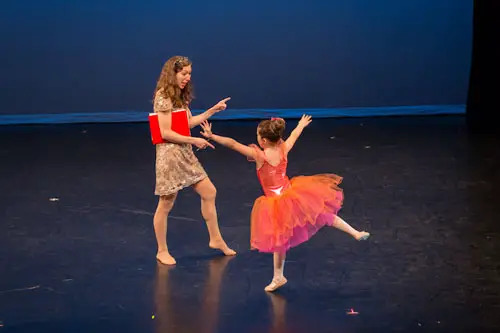How to help your child embrace competitive pursuits–such as ballet–by dealing with disappointments and competition in a positive way. By Anne Easterling Freifelder, founder and director of The Ballet Club
The Disappointments
Perhaps the single most predictable and yet unavoidable disappointment is not to be selected for a favorite part in a performance. The student has set her heart on it, and she’s practiced and learned it to perfection–but she is still not chosen. No matter how hard the teacher or director tries, it is impossible to assign everyone the part she wants.
This is where parents can help. First, point out to your child the fact that she is not the only one working hard and able to do the part. There may also be other reasons for the selection unrelated to hard work and ability. I, like every other dancer in the world, remember my mother helping me through my own disappointment by discussing good reasons why another child might have been chosen and showing me that it had no reflection on my ability. More importantly, she helped turn my focus to the part for which I had been selected and helped me see all the opportunities it afforded.
What I learned from this experience was to recognize that I was not the only student who was working hard, that we all have different strengths, that I could appreciate how our different strengths put together made for a strong show, and that I could learn from watching someone else who had qualities that I did not possess.
Not being chosen for a favorite part, therefore, while probably unavoidable, has the advantage of helping the child learn to cope positively with disappointment, a valuable lesson for life.
Another disappointment that is perhaps inevitable is the occasional “bad” class or period of time when progress slows. Again, it is important to help your child move through these difficult times by helping her focus on the positive and the joy that brought them to dance, and to recognize that bad days or periods of time are an unavoidable part of life, and they pass. From this the student learns to persevere–an invaluable lesson for life.
| Anne Easterling Freifelder, founder and director of The Ballet Club, works with a student. |
Competition
A second concern of parents is that a focus on achievement can create an intensely competitive environment that can be unhealthy for the child. In order to prevent this, the focus always should be on the individual and the progress she is making, not on how she compares to classmates. “What am I learning? How can I advance and improve?” These are the questions the student should be asking. Doing so will make the student much happier than focusing on how she compares to others, and will help her gain an understanding of the almost endless possibilities for learning and advancing.
Students should focus on learning the craft: Some are good at turns, some at jumps. Some dancers excel at expressing emotion and drama via movement, some at choreography, some at lyrical movement, some at fast staccato movement. As long as one looks at the craft with a mind open to possibility, there are endless opportunities for developing creativity.
If children are overly focused on what part they are going to have, and/or on measuring themselves against others, recalibrate their focus on what it is that they love about ballet and on developing their craft. They should not focus on being “the best”–they should focus on building, growing, and being better than they were the day before.
Remember too, that the craft of dance and ballet involves math, logic, language, humanities, drama (and obviously the arts, in addition to pure physical fitness) among other things. If you keep this in mind, children’s studies in ballet provide a wonderful tool to enhance their academic experience, as well as provide an emotional and physical outlet. I remember when I discovered the connection between dance and physics, and how I could not wait to go to physics class so that I could figure out how to improve my dancing.
My goal for all my students at The Ballet Club is to inspire in them a love and appreciation for ballet, and instill in them a desire to achieve a level of excellence in ballet that they can, and I hope will, practice all of their lives. It is an enormously enjoyable activity and the practice is good for their physical and emotional health, regardless of whether they wish to pursue a professional career.
Photos by Jaqlin Medlock.


















